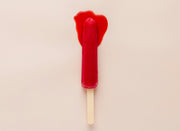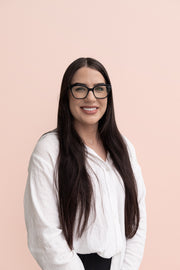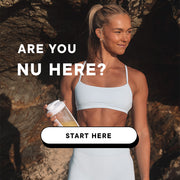
Why Are Women Especially At Risk Of Iron Deficiency?
Did you know frequent infections, tiredness, a foggy head and poor stamina may mean you have low iron levels?
Iron is an essential micronutrient and it’s vital to overall health. However, iron is also one of the most common nutrient deficiencies worldwide, and is more common in women than men. Iron deficiency anaemia is a condition that occurs when you have low levels of haemoglobin.
Haemoglobin is a protein inside your red blood cells, and it carries oxygen to your tissues. Your body uses iron to make haemoglobin, which explains why not getting enough iron causes anaemia. Iron deficiency can be caused by not consuming enough iron through your diet, or by a few other reasons we will go into below.
WHY ARE WOMEN'S IRON LEVELS ESPECIALLY LOW?
While iron is essential for everyone, it holds particular importance for women due to the special demands our bodies face. The causes of iron deficiency in women can be due to a number of factors, and some may not be as obvious as you think. If more than one of the factors below apply to you, your risk of having an iron deficiency is further increased.
1: YOU HAVE A PLANT BASED DIET
Even with a well balanced plant-based diet you may need to supplement in order to provide sufficient intake of certain nutrients, and iron is one of the most important to consider. This is because animal products are the highest-containing and most readily absorbed source of dietary iron (haem iron). There is non-haem iron in plant foods, however this iron is less bioavailable.
2: YOUR DIET IS LACKING IN OTHER NUTRIENTS
If you are deficient in other important nutrients like vitamin A, C, folate and B12, it can also affect your iron levels. Maintaining a varied and seasonal diet can help ensure you are eating a nutrient rich diet.
3: YOU HAVE A HEAVY PERIOD OR ABNORMAL BLEEDING
During your period, iron is lost with your blood. You can develop anaemia if the blood loss is too heavy, or if that iron isn’t replenished via your diet during your cycle. If you experience bleeding that is abnormal, such as your period lasting 14 days, this can also lead to iron deficiency .
4: YOU'RE PREGNANT
Did you know that your iron levels naturally decline during pregnancy? During pregnancy, the mother's blood volume increases by about 50%, so a mild deficiency can be normal during pregnancy. However, iron is needed to help build blood cells in both the mother and foetus, so it is important to monitor your levels and ensure they don’t drop too low.
5: YOU EXERCISE REGULARLY
Iron is lost in sweat and urine, so if you exercise regularly, you may need to consume more iron to replenish the iron that is lost and keep your iron stores at a healthy level.
6: YOU HAVE POOR GUT HEALTH
Low stomach acid, coeliac disease and gastrointestinal disorders can affect your small intestine’s ability to properly break down and absorb the nutrients in the food you eat, including iron.
7: YOU'RE TAKING A POORLY ABSORBED IRON SUPPLEMENT (OR TAKING TOO MUCH)
Some forms of iron are poorly absorbed and can cause nasty side effects like constipation and upset stomachs. This is especially common with ferrous sulfate forms. Iron bisglycinate is a gentle, and well absorbed form of iron. Additionally, taking iron supplements every day may hinder your body’s ability to absorb the iron, which is why it may be recommended by your health care practitioner to switch to taking your iron supplement every 2nd day.
IRON AND DIET
Iron comes in two forms, haem and non-haem. Haem iron is the most easily absorbed form and is found in red meat, dark meat poultry (legs and thighs), liver, pork, and fish. Non-haem iron is harder for your body to absorb and is found in beans & lentils, tofu, chickpeas and dark leafy greens.
Iron absorption trick: pair Vitamin C rich foods (berries, citrus, capsicum, broccoli) with iron rich foods as pairing with Vitamin C helps the absorption of iron.
Our Busy Gal all-in-one shake is a nutritional powerhouse meticulously designed for women. Packed with 40% of your recommended daily intake (RDI) of iron, alongside crucial vitamins like magnesium, zinc, B12, Vitamin D, and Calcium. Busy Gal is your solution, ensuring you never compromise on flavour or wellness standards, even on your busiest days.

By Breeanna Betar
Breeanna is a degree qualified Clinical Nutritionist specialising in women’s health. In her private clinic, she works one on one with women to help them achieve their health goals. Bree possesses a profound understanding of women’s health needs and is committed to sharing her knowledge with the Naked Harvest community, and is proud to be involved in Naked Harvest’s mission of revolutionising the active supplement industry.
![[Nav_Category_shop-all.jpg] SHOP ALL](http://www.nakedharvestsupplements.com/cdn/shop/files/Nav_Category_shop-all_medium.jpg?v=229551162107522660)
![[Nav_Category_protein.jpg] PLANT PROTEIN](http://www.nakedharvestsupplements.com/cdn/shop/files/Nav_Category_protein_medium.jpg?v=3001415470058422894)
![[Nav_Category_pre.jpg] NATURAL PRE-WORKOUT](http://www.nakedharvestsupplements.com/cdn/shop/files/Nav_Category_pre_medium.jpg?v=6814586239177681891)
![[Nav_Category_electrolytes_v2.jpg] ELECTROLYTES](http://www.nakedharvestsupplements.com/cdn/shop/files/Nav_Category_electrolytes_v2_medium.jpg?v=8085001776675848411)
![[Nav_Category_moonmylk.jpg] BEDTIME HOT CHOCOLATE](http://www.nakedharvestsupplements.com/cdn/shop/files/Nav_Category_moonmylk_medium.jpg?v=12631405938823957710)
![[Nav_Category_Creatine.jpg] CREATINE](http://www.nakedharvestsupplements.com/cdn/shop/files/Nav_Category_Creatine_medium.jpg?v=5379326253006347654)
![[Nav_Category_Matcha.jpg] MATCHA & CHAI](http://www.nakedharvestsupplements.com/cdn/shop/files/Nav_Category_Matcha_medium.jpg?v=12528052245834137118)
![[Nav_Category_wellness.jpg] GORGEOUS GREENS](http://www.nakedharvestsupplements.com/cdn/shop/files/Nav_Category_wellness_medium.jpg?v=12528176088121862281)
![[Collagen_category.jpg] COLLAGEN](http://www.nakedharvestsupplements.com/cdn/shop/files/Collagen_category_medium.jpg?v=7874986955741861029)
![[Nav_Category_onthego.jpg] ON-THE-GO](http://www.nakedharvestsupplements.com/cdn/shop/files/Nav_Category_onthego_medium.jpg?v=9258968730903582129)
![[Nav_Category_accessories.jpg] ACCESSORIES](http://www.nakedharvestsupplements.com/cdn/shop/files/Nav_Category_accessories_medium.jpg?v=8748347510610747858)
![[Nav_Category_samples.jpg] SAMPLES](http://www.nakedharvestsupplements.com/cdn/shop/files/Nav_Category_samples_medium.jpg?v=12269696752583776743)
![[Nav_Category_giftcard.jpg] GIFT CARDS](http://www.nakedharvestsupplements.com/cdn/shop/files/Nav_Category_giftcard_medium.jpg?v=1625935370118938582)
![[Nav_Category_pilates.jpg] Yoga/Pilates](http://www.nakedharvestsupplements.com/cdn/shop/files/Nav_Category_pilates_medium.jpg?v=13143021470193189408)
![[Nav_Category_high-intensity.jpg] High Intensity](http://www.nakedharvestsupplements.com/cdn/shop/files/Nav_Category_high-intensity_medium.jpg?v=1128519081117118136)
![[Nav_Category_low-intensity.jpg] Lifestyle](http://www.nakedharvestsupplements.com/cdn/shop/files/Nav_Category_low-intensity_medium.jpg?v=9882188842252146182)
![[Nav_Category_strength.jpg] Strength Training](http://www.nakedharvestsupplements.com/cdn/shop/files/Nav_Category_strength_medium.jpg?v=12070627897078322724)







